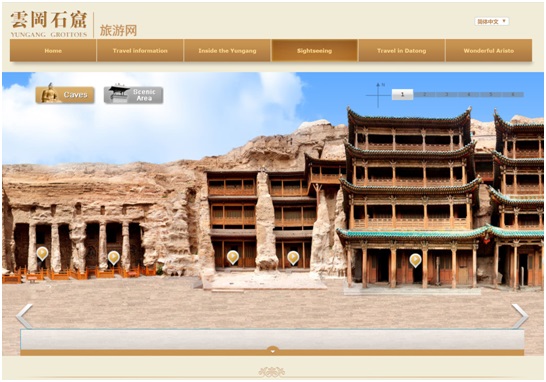By Qiao Dong, Xu Jing, People’s Daily
After more than a month of suspension, scenic attractions in China have reopened one after another as the situation of the novel coronavirus (COVID-19) becomes under control.
To provide visitors a safe environment, the scenic attractions have strengthened disinfection measures, guided tourists to avoid cross-infection, limited the massive flows of tourists and rolled out non-contact ticketing services.In addition, through developing cloud tourism, the cultural tourist industry is exploring new ways of operation and expanding the development space.
Yungang Grottoes in Datong city, north China’s Shanxi province reopened on March 1, and received 130 tourists that day. Yao Jie and Zhao Xu, two citizens from Datong, were the first visitors entering the scenic site. According to Yao, the travel experience was fresh, not only because of the smaller number of tourists, but also strict control measures taken there.
Before entry, tourists must have their basic information and health status recorded, and their body temperatures measured. The scenic site also warns visitors to wear masks and avoid gathering and spitting through a speaker.
While putting tourist flow under control in the one week after reopening, the scenic site has been making attempts to present a clear and panoramic view of the tourist area by virtual reality technology to satisfy tourists’ demand. The efforts have made online sightseeing a major source of income for the scenic spot.
The online travel services enable tourists to see clearly grottoes of different heights and shapes on their cell phones, go to all corners of the scenic site, have a close look at the Buddha sculptures from all angles and enjoy professional tour guide services.
Yungang Grottoes started digitalization in 2015, said Ning Bo, head of the digitalization department with Yungang Grottoes Research Institute.
To present the grottoes to more people, Ning’s team visited the Palace Museum and Dunhuang Academy China for 7 times to learn about technologies such as data collection, color management, and network application. They also established their own modelling team.
Tianzhushan Mountain in east China’s Anhui province is 1,000 kilometers away from Yungang Grottoes. After a month-long suspension, the scenic site reopened on Feb. 24 and received 215 visitors that day.
The scenic spot had formulated a marketing plan for the Chinese New Year, but due to the stagnation caused by the spread of coronavirus, it had to adjust the plan and find a new way out.
Wang Quanhai, chairman of Anhui Tianzhushan Tourism Development Co., Ltd., said Tianzhushan Mountain is a regional tourist attraction, and he was thinking about how to upgrade the regional scenic spot into a national one over the past month.
Wang and his colleagues proposed to move the scenic spot online. Through online sightseeing, online tour guide services, and livestreaming, more visitors could have access to scenery of the mountain, Wang explained, adding that this online model offers new travel experiences and more pleasure for visitors, and makes the process more immersive.
While reopening the scenic site, the company has restarted the construction of a smart scenic spot it had planned. According to Wang, in the near future, big data recorded will help the scenic spot learn the source of visitors, their means of transportation, duration of stay and consumption. In addition, multiple functions will be launched such as smart parking, ticket booking, and tourist protection.
The scenic spot is upgrading both hardware and software to improve management and services, Wang said. “We’ll improve our products and services in order to better serve the tourists,” he said, believing that the scenic spot will embrace prosperity after the epidemic is completely curbed.
Photo shows the web page of Yungang Grottoes. The online platform enables tourists to enjoy a panoramic view of the tourist area, as well as in-depth demonstration and interpretation. Photo courtesy of the official website of Yungang Grottoes.












Leave a Comment